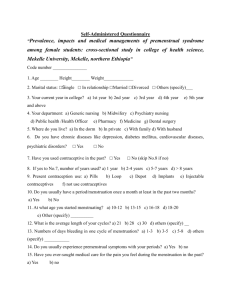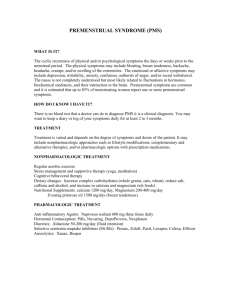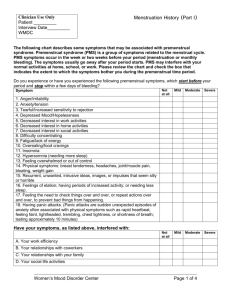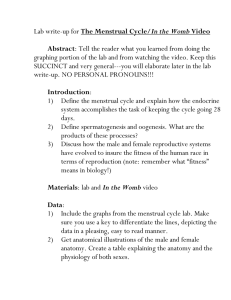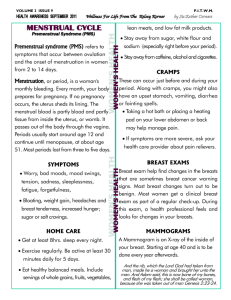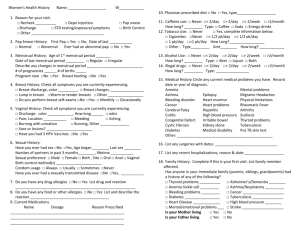口服避孕藥 財團法人奇美醫院 蔡永杰醫師
advertisement
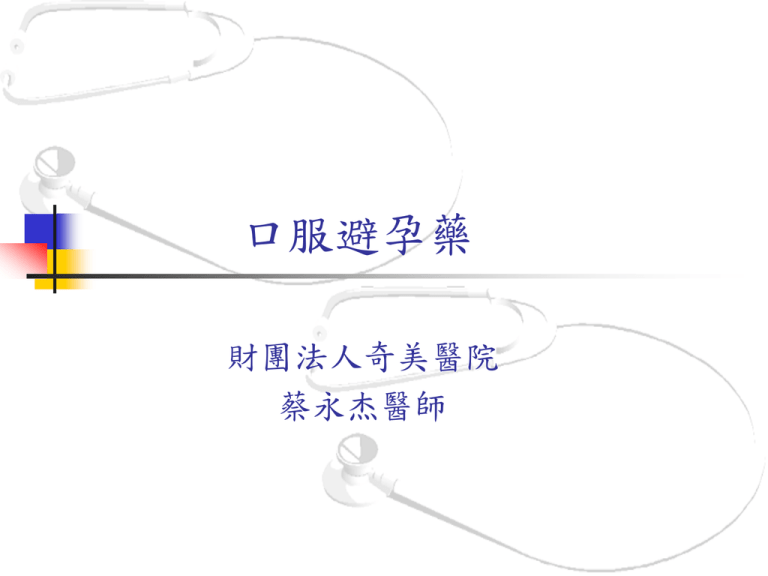
口服避孕藥 財團法人奇美醫院 蔡永杰醫師 什麼是「口服避孕藥」? 口服避孕藥是一種賀爾蒙製劑,依作用方 式分為二類 動情素與黃體素的綜合製劑 「單相型」(monophasic) 「多相型」(multiphasic)兩種 單純黃體素的製劑 Types of COCs Monophasic: All 21 active pills contain same amount of Estrogen/Progestin (E/P) Biphasic: 21 active pills contain 2 different E/P combinations (e.g., 10/11) Triphasic: 21 active pills contain 3 different E/P combinations (e.g., 6/5/10) 口服避孕藥的作用機轉 Suppress ovulation Reduce sperm transport Endometrium atrophy Thicken cervical mucus Failure rate is 0.2-0.5 per 100 woman years 4 COCs: Contraceptive Benefits Highly effective when taken daily Effective immediately if started by day 7 of menstrual cycle Do not interfere with intercourse Few side effects Convenient and easy to use Can stop use 1Hatcher et al 1998. 5 COCs: Noncontraceptive Benefits Decrease menstrual flow (lighter, shorter periods) Decrease menstrual cramps May improve anemia Protect against ovarian and endometrial cancer Decrease benign breast disease and ovarian cysts Prevent ectopic pregnancy Protect against some causes of PID 6 口服避孕藥的成分 動情素 Ethinyl estradiol Mestranol 所謂的「低劑量」口服避孕 藥指其動情素劑量小於0.05 毫克(=50 ug), 而黃體素劑 量小於0.15毫克(=150ug)。 黃體素 Levonorgestrel Norethindrone 由睪脂酮改造合成。保 留些微的男 性化的潛在 影響。 Classification Type of progesterone Monophasic pills Triphasic pills Levonorgestrel Microgynon 30/EE Ovranette (30 EE) Eugynon (30 EE) Trinodial Logynon Norethisterone Ovysmen / Brevinor (35 EE) Norimin( 35) Loestrin 20/30 Trinovum Binovum Synphase Norgestimate Cilest (35 EE) Desogestrol Mercilon 20 EE Marvelon 30 EE Gestogene Femodene (30EE) Minulet (30 EE) Femodette(20 EE) Drospirenone Yasmin (30 EE) Tri-Minulet Side effects Oestrogenic Nausea, dizziness, bloating, breast engorgement, vaginal discharge, premenstrual tension, migranes Change to a more progestogenic prep/ Reduce dose of oestrogen and inc dose of progesterone. Progestogenic Vaginal dryness, inc wt, reduced libido, acne, mastalgia, depression/lethargy, scanty menses Change to more osetrogenic COCs: Who Should Not Use COCs should not be used if a woman: Is pregnant (known or suspected) Is breastfeeding (< 6 weeks postpartum) Is jaundiced (symptomatic viral hepatitis or cirrhosis) Has ischemic heart disease or stroke (current or history of) Has blood clotting disorders (deep vein thrombophlebitis or pulmonary embolus) Source: WHO 1996. 10 COCs: Who Should Not Use COCs should not be used if a woman: Is a smoker and age 35 years or older Has diabetes (> 20 years duration) Has headaches (migraine) Has high blood pressure (> 180/110) Has breast cancer Has liver tumors Has to undergo major surgery with prolonged bed rest Source: WHO 1996. 11 COCs: Conditions Requiring Precautions Is < 3 weeks postpartum (even if not breastfeeding) Has unexplained vaginal bleeding (only if serious problem suspected) Has high blood pressure (160/110) Has a history of breast cancer Has symptomatic gall bladder disease Is taking drugs for epilepsy (phenytoin or barbiturates) or tuberculosis (rifampin) Source: WHO 1996. 12 Progesterone only Pill (POP) Becoming increasingly popular They can be used with no age limits,in smokers, duringlactation and even for women at risk of VTE Efficacy Failure rate of 0.3-5 per 100 woman years Mode of action Mainly thickening cervical mucus Atrophy of endometrium, hinders implantation Interfere with tubal transport of ova Progesterone only Pill (POP) POP Type of progesteron Norethisterone 350mcg Micronor Noriday Levonorgestrel 30mcg Microval, Norgeston Di norgestrel 75mcg Neogest Etynodiol diacetate 500mcg Femulen Disogestrel 75mcg Cerazette Indications < 21 days post partum. 6wks-6mths postpartum partially or fully BF Age> 35 and smoke BMI> 35 Multiple risk for CVS Those at risk of VTE, inc personal hx Hypt controlled with meds DM/ CHD/ valvular problems CIN/ endometrial ca/ ovarian ca F Hx Breast ca SCD Contraindications Uncontrolled hypertension Active hepatitis/ decompensated cirrhosis/ liver tumours Mal absorption Current DVT Undiagnosed Genital tract bleeding Recent trophoblastic dx with high bHCG Current IHD Current breast Ca Past severe side effects Acute porphyria 口服避孕藥的臨床用途 避孕 月經異常、亂經 痛經 子宮內膜異位症 卵巢功能性水瘤 經前症候群 多囊性卵巢 多毛症 青春痘 試管嬰兒治療 Polycystic Ovarian Syndrome(PCOS) 多囊性卵巢 Features of PCOS Clinical features Menstrual irregularities Hirsutism Alopecia Acne Anovulatory infertility Recurrent miscarrage Endocrine features Androgen↑ LH ↑ Estrogen ↑ Prolactin ↑ Metabolic features Obesity . Insulin resistance Lipid abnormalities Type II DM 多囊性卵巢(PCOS) 此類女性患者常伴有月經不規則、數月 才來一次月經、甚至暫時不來月經的症 狀。 此類患者如不想生育,可服用避孕藥來 維持規則的人為月經週期,不但患者可 以心安,也可以避免經常催經的困擾。 宮能異常性子宮出血 (Dysfunctional Uterine Bleeding) Bleeding from the uterine endometrium unrelated to anatomic lesions of the uterus. For example, disruption of normal ovarian function or anovulation, midcycle staining associated with ovulation, menstrual irregularity associated with corpus luteum defect. 經血過多 Menses lasts longer than 7 days or a menstrual blood loss exceeding 60 to 80 ml. 月經異常、亂經 此類患者會有月經太多、太長、非常 不規則的症狀,這種異常經檢查後, 如果是無排卵性的亂經或沒有女性生 殖器官的病灶,可以試著服用避孕藥 一段時間,以調整經期。 COCs: Menstrual Blood Loss and Anemia Decrease menstrual blood loss (20 ml versus 35 ml) Prevent iron deficiency anemia (50%) Improve existing iron deficiency anemia 痛經 (Dysmenorrhea) Menstrual pain begins with the onset of menstruation and lasts for a few hours. It ordinarily has a spasmodic, colik, labor-like nature but is sometimes described as an aching or heaviness in the lower abdomen. 痛經 (Dysmenorrhea) 原發性經痛(Primary Dysmenorrhea) Menstrual pain observed in the absence of any identifiable pelvic lesion and due to factors intrinsic in the uterus 次發性經痛(Secondary Dysmenorrhea) Menstrual pain observed in the presence of other pelvic disease 痛經 有些女性月經來潮時常感下腹疼痛劇烈, 但找不出任何病灶,我們稱為原發性痛 經。這種明顯沒有病因的痛經,除了以 止痛藥克服外,也可服用避孕藥,其效 果對高達90%的人來說,能有效緩解。 子宮內膜異位 Endometriosis RIGHT TISSUE, WRONG PLACE 發病原因 月經逆流說 月經來潮子宮收縮時,除了 把剝落的子宮內膜經由子宮 頸排出體外,也把子宮內膜 經由輸卵管推入腹腔。 此理論也可解釋為何子宮內 膜異位會一而再再而三的發 生。 發病原因 免疫系統功能不全 目前研究顯示子宮內膜異位是 免疫疾病的一種。 子宮內膜異位患者的T淋巴球 功能降低以至於無法清除這些 亂跑的子宮內膜、於是這些內 膜組織,就附在人體的其它組 織,如:卵巢、輸卵管、膀胱、 大腸、子宮直腸凹陷。 The Stages of Endometriosis Management Observation Palliative therapy : analgesics, NSAIDs Endocrine therapy : GnRHa, danazol, gestrinone, OCP, progesterone, androgens Surgical therapy ART Management:口服避孕藥 Oral contraceptives: mimicking pregnancy may cause endometrial regression and subjective improvement 。 side-effects include nausea, vomiting, breakthrough bleeding, weight gain, water retention, breast tenderness, acne 。 可減輕子宮內膜異位症經痛,抑制及控制病 情 不再擴展。 子宮內膜異位症 有子宮內膜異位症但不想手術開刀; 或手術治療後擔心復發或已經復發, 可藉避孕藥中的雌性素和黃體酮的混 合作用,暫時把痛經或子宮內膜異位 症穩定住,使病灶範圍不再惡化 。 當子宮內膜異位症長到子宮體 內時(子宮肌腺症),服用避孕藥也有 緩解痛經和經血太多的效果。 卵巢功能性水瘤 大小超過三公分的卵 巢水囊瘤頗為常見,造 成不少婦女的恐慌。有 些醫師會請患者短期服 用避孕藥,冀望這些惱 人的瘤趕快消失。 試管嬰兒治療 進行試管嬰兒治療前先服用至少一個 月避孕藥,可能可改善懷孕成功率 先服用避孕藥,可暫時抑制這些患者 體內太高或不良的女性荷爾蒙,例如 改善不正常的LH/FSH比值、太高的雄 性素等;其後注射排卵針劑刺激卵巢 製造卵子時,可以獲得品質比較優良 的卵子,從而增加卵子受精後胚胎著 床懷孕的機會。 多毛症 服用期間,體內荷爾蒙 分泌會被抑制,尤其是 男性荷爾蒙會降低,使 毛變細變短,讓男性化 的多毛現象可以改善。 Premenstrual Syndrome(PMS) Premenstrual Syndrome(PMS) Premenstrual Syndrome (PMS) is a collection of physical, psychological, and emotional symptoms related to a woman's menstrual cycle estimates of prevalence range from as low as 3% to as high as 30% Premenstrual Syndrome(PMS) Abdominal bloating Abdominal cramps Breast tenderness or swelling Stress or anxiety insomnia Joint or muscle pain Headache Fatigue Acne Mood swings Irritability anxiety, depression , irritability, Changes in libido Worsening of existing skin disorders, and respiratory (allergies, infection) Etiology The exact causes of PMS are not fully understood. Current thinking suspects that central-nervous-system neurotransmitter interactions with sex hormones are affected. It is thought to be linked to activity of serotonin in the brain . PMS/PMDD Premenstrual syndrome (PMS) is a premenstrual disorder characterized by bothersome adverse somatic and/or affective symptoms. As defined by the American Psychiatric Association, premenstrual dysphoric disorder (PMDD) is the most severe type of premenstrual disorder associated with significant impairment. COCs: Decreased Ovarian Cancer Risk 40-80% decrease in risk compared to nonusers Protection: Begins by 1 year of use Increases with duration of use Persists at least 10-15 years after COCs are stopped Is biologically possible 口服避孕藥對心臟血管系統有沒有影響? 高劑量的口服避孕藥會增加靜脈血栓, 心肌梗塞與腦中風的危險。 低劑量的口服避孕藥,對心臟血管 系統沒有特別「好」或「壞」的影響。 口服避孕藥是否會引起高血壓? 約有百分之五的口服避孕藥使 用者會出現高血壓。 可能與「特異體質反應」有關 即使服用低劑量的口服避孕藥 仍應定期接受血壓測量。 口服避孕藥是否會引起糖尿病? 黃體素會加強人體周邊組織對於胰島素的抵 抗力,致使短暫血糖上昇,但不致引發明顯 的糖尿病 動情素會改變肝臟的脂肪代謝與酵素作用, 並使游離的腎上腺皮質素濃度增加,間接促 進了醣類代謝的異常。 這些變化都是可逆的,停藥就會恢復。對於 已罹患糖尿病的患者,建議使用其他方法避 孕,以避免血糖控制不良並預防血栓產生。 口服避孕藥對肝膽系統有沒有影響? 動情素可改變膽汁的成分,使膽汁內的膽 固醇飽和度增加,易活化原本無症狀的結 石或加速膽囊結石的形成。 急慢性的膽汁鬱積疾病,是口服避孕藥的 絕對禁忌。 口服避孕藥對腸胃系統或體重有無影響? 使用者在使用後的頭幾個月會有 噁心,嘔吐與體重增加的現象。 口服避孕藥並不會增加消化性潰 瘍的發生率。 口服避孕藥對皮膚有沒有影響? 有百分之五的使用者會 有「黃褐斑」的產生, 使用低劑量的口服避孕 藥可降低發生率,但一 旦發生,即使停藥也只 會慢慢消褪,不會完全 消失。 口服避孕藥對心理精神方面有沒有影響? 高劑量的口服避孕藥的使用者,偶有 出現憂鬱沮喪的現象,一般認為是高 劑量的動情素干擾了色胺酸(Tryptophan)的 合成所致,建議一旦出現憂鬱症狀, 最好還是停藥。 少數使用者會出現性慾降低的現象, 處置方法同上。 口服避孕藥對甲狀腺有沒有影響? 動情素會增加甲狀腺結合球蛋白的 濃度,所以血中甲狀腺素的測定值 會上昇。 游離甲狀腺素(FT4)與甲狀腺刺激 素(TSH)的測定值仍維持正常。 口服避孕藥與婦科癌症的關係 口服避孕藥對子宮內膜癌有預防效果 口服避孕藥對卵巢癌有預防的效果。 有研究顯示服用口服避孕藥對子宮頸 鱗狀上皮癌的罹患機率只有些微的影 響,但對子宮頸的腺癌的罹患率卻有 顯著的升高。 口服避孕藥與肝臟腫瘤 男性或女性賀爾蒙都可能引發肝臟腺瘤 (Hepatocellular adenoma)。 與服用的年限及劑量有關,停藥後會自 行消退。 口服避孕藥與肝癌並無關連 口服避孕藥與乳房腫瘤 服用口服避孕藥與乳癌的關係目前 尚待研究。 建議定期實施乳房檢查,高危險群 必要時接受乳房X光攝影檢查。 口服避孕藥會不會影響以後的生育能力? 停藥後約有百分之二十五的女性會有 暫時性的排卵延遲現象。 在停藥後的頭三個月懷孕率較低,在 停藥後二十四個月,約有百分之九十 的使用者可以成功懷孕。 並無證據顯示使用口服避孕藥會增加 不孕的比率。 停用口服避孕藥後會不會無月經? 約有0.7-0.8%的婦女會有停藥後無 月經的現象。 此比率與自發性的停經之發生率相 當。 目前無證據顯示口服避孕藥會導致 續發性停經。 口服避孕藥可以預防性病嗎? 由於服用口服避孕藥而使子宮頸黏液 更為黏稠,使致病菌不易進入子宮腔 或輸卵管;同時經血量減少,使致病 菌無足夠的生長基質,因此可降低骨 盆腔炎症 對於病毒性傳染,仍以阻隔式的避孕 方法為佳。
